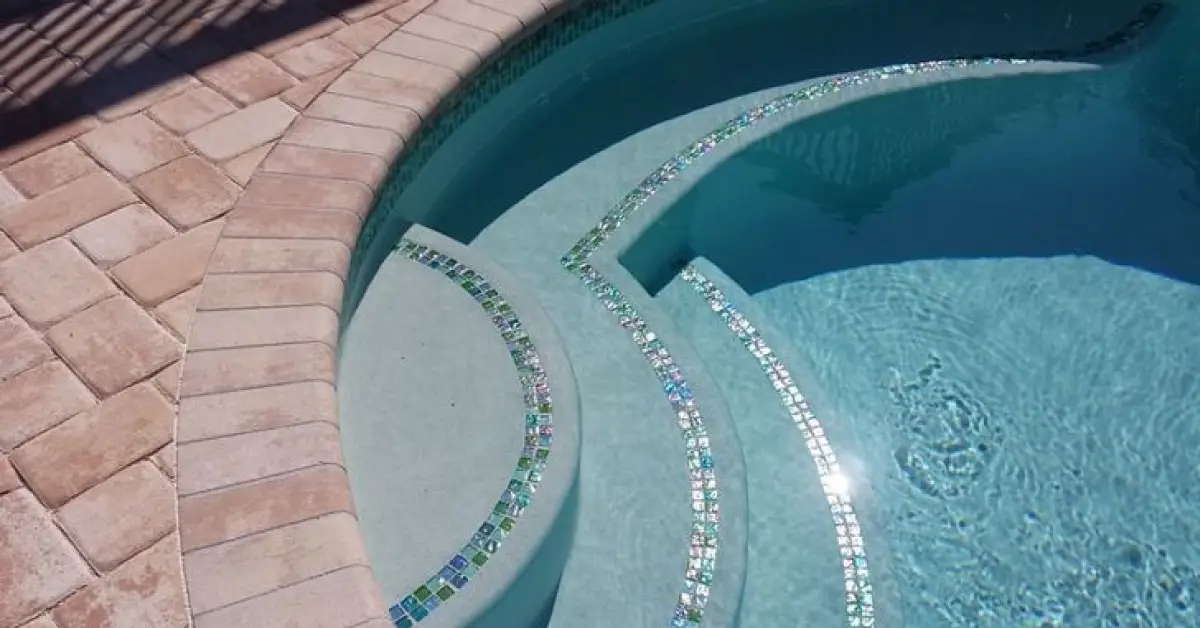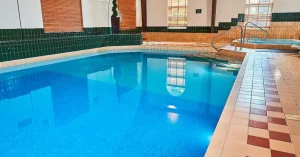Understanding the Differences: Pool Tiles vs Regular Tiles
Have you ever wondered why your neighbor’s swimming pool looks so inviting with those shimmering blue tiles, while your bathroom tile just doesn’t have the same appeal? The answer lies in the question, “are pool tiles different?” Let’s dive in and explore the differences between pool tiles and regular tiles, and why it matters.
- Pool tiles are designed for use in swimming pools and provide greater durability than regular tiles.
- Pool tile features include easy cleaning, resistance to mold & pool chemicals, decorative elements, safety & variety of options.
- Professional installation and maintenance is essential for optimal performance & longevity of pool tiles.
Understanding Pool Tiles and Regular Tiles
Swimming pool tiles are specifically engineered for use in swimming pools, while regular tiles, including bathroom tile, are utilized for various indoor and outdoor purposes, such as kitchen and bathroom floors and walls. The primary distinctions lie in the materials utilized, durability, and intended purpose. Pool tiles are usually constructed with ceramic tile, porcelain, or stone, while regular tiles can be composed of ceramic, porcelain, stone, glass, metal, or wood.
Given the wear and tear in the pool environment, pool tiles outlive regular tiles in terms of resilience and lifespan. Glass tile stands out for its hardiness and defiance to pool chemicals.
While swimming pool tiles protect the pool structure from water damage, regular tiles serve decorative purposes or offer a non-slip surface.
Materials Used in Pool Tiles and Regular Tiles
Pool tiles are typically constructed of porcelain tile, glass, or natural stone, whereas regular tiles are usually manufactured from ceramic tiles, porcelain, or other materials not suitable for pool use. White swimming pool tiles, for example, can create a clean and bright appearance that is perfect for a refreshing dip on a hot day. Regular tiles, on the other hand, are made from a variety of materials, such as ceramic, porcelain, and even wood, which may not be suitable for the wet and harsh environment of a pool.
Traditional 6” x 6” porcelain tiles have been commonly used for the swimming pools’ waterline area. However, glass mosaics, known for their timeless aesthetic and potential for an unlimited lifespan, have gained popularity recently. The choice of material will largely depend on the specific needs and preferences of the pool owner, as well as the overall design and aesthetic goals for the pool area.
Durability and Lifespan
Owing to their design to withstand harsh conditions of exposure to water, sun, and rain, pool tiles tend to outlast regular tiles in durability. Blue swimming pool tiles, in particular, are popular for their ability to create a refreshing and inviting look. Pool tiles boast greater durability and a longer lifespan than regular tiles, as they are resistant to water, chemicals, and temperature fluctuations.
In contrast, regular tiles may not possess the same level of longevity and may necessitate additional upkeep to maintain their optimal appearance. It is essential to select pool tiles that meet the requisite slip resistance standards to guarantee a secure pool environment and avoid accidents.
Purpose of Pool Tiles vs. Regular Tiles
Pool tiles serve both functional and aesthetic roles in swimming pools, contrasting with regular tiles, which cater to aesthetic and protective needs in interior and exterior spaces. In swimming pools, blue tiles around the waterline serve to:
- Protect the pool structure and prevent a yellow ring caused by body oil, sunscreen, and other substances
- Provide a finishing touch to the pool
- Allow for aesthetic customization, ensuring that your pool stands out from the rest.
Regular tiles, on the other hand, are often used for decorative purposes in spaces like kitchens and bathrooms. They can also provide a non-slip surface in areas where safety is a concern, such as shower floors or entryways. While regular tiles can certainly add visual appeal to a space, they do not offer the same level of protection and durability as pool tiles specifically designed for swimming pools.
Pool Tile Features and Benefits
Pool tiles provide several features and benefits that set them apart from regular tiles, including:
- Easy cleaning
- Resistance to mold and pool chemicals
- Durability
- Decorative elements
- Safety
- A variety of options, such as glass mosaic pool tiles that can create stunning visual effects
These features make swimming pool tile an ideal choice for pool tiles in swimming pools, ensuring that your pool and your neighbor’s swimming pool remain both functional and attractive.
Some of the most important features of pool tiles are their slip resistance, chemical resistance, and frost resistance. These properties contribute to the overall safety and durability of pool tiles, making them a smart investment for any pool owner.
Slip Resistance
Slip resistance refers to the friction between a surface and a person’s foot, which is used to assess the slipperiness of a surface and the likelihood of a person slipping and falling. Pool tiles typically feature a slip resistance rating of R11 or higher, which indicates a high level of slip resistance and ensures safety in wet environments.
The slip-resistant nature of pool tiles aids in reducing the risk of slips and falls, contributing to safer swimming pools. By selecting pool tiles with the appropriate slip resistance rating, you can create a safe and enjoyable environment for swimmers of all ages.
Chemical Resistance
Chemical resistance refers to a material’s ability to resist damage when exposed to harsh chemicals, including cleaning agents and pool chemicals like chlorine. Pool tiles, particularly glass mosaic tiles, are renowned for their high chemical resistance. They can withstand a wide range of chemical products, ensuring that pool tiles remain undamaged and retain their appearance over time.
This resistance to chemicals not only contributes to the overall durability and longevity of pool tiles but also means that pool owners can rely on their tiles to withstand the regular use of water cleaning chemicals without compromising their look or performance.
Frost Resistance
Frost resistance refers to the capacity of a material to endure extreme temperature changes without fracturing or becoming damaged. The frost resistance of pool tiles varies depending on the material, with porcelain tiles considered to be frost-proof and able to withstand freezing temperatures.
Frost-resistant pool tiles have several advantages for outdoor pools, especially in colder climates:
- They can withstand freezing temperatures without cracking or breaking.
- They are designed to resist the expansion and contraction caused by temperature fluctuations.
- They maintain their color and appearance even in harsh conditions.
- They provide a durable and long-lasting surface for your pool.
By choosing frost-resistant pool tiles, you can ensure that your pool remains both functional and attractive, regardless of the weather conditions.
Choosing the Right Tile for Your Swimming Pool
The selection of pool tiles requires consideration of various aspects like color options, format and chip size, and budget for achieving the desired aesthetic appeal and functionality. By carefully considering these factors, you can create a swimming pool that not only meets your functional needs but also reflects your personal style and preferences.
Aided by a detailed examination of color options, format and chip size, and budget considerations, you can make the best tile selection for your pool.
Color Options
Blue is a common choice for swimming pool tiles blue, as it creates a refreshing and inviting look that most swimming pool owners find appealing. The blue color of the pool tiles can evoke images of crystal-clear blue ocean water or white sand beaches, making it a popular choice for creating a relaxing and inviting swimming environment. However, other color options are also available for pool tiles, including white, green, and darker shades.
White tiles can create a clean and bright appearance, while green tiles can add a touch of nature to your pool environment. Darker shades, such as charcoal or chocolate brown, can create a more sophisticated and modern look. The choice of color ultimately depends on your personal preferences and the overall aesthetic you wish to achieve for your swimming pool.
Format and Chip Size
Choosing the right format and chip size for your pool tiles can significantly impact the overall appearance and functionality of your pool. The different formats and chip sizes of pool tiles include:
- 2” x 4”
- 3” x 3”
- 3” x 6”
- 4” x 4”
- Porcelain mosaic tiles with chip sizes smaller than 6” x 6”, such as 1” x 1”, 1” x 2”, 2” x 2”, 3” x 3”, mixed, and linear.
When selecting the appropriate format and chip size for your pool tiles, take into account the overall aesthetic you wish to accomplish, as well as the size of the area you are tiling, such as the entire pool or just the waterline. By carefully considering these factors, you can create a visually appealing and functional pool environment that meets your needs and preferences.
Budget Considerations
When selecting pool tiles, it’s important to consider your budget, as the costs can vary depending on the material and design. Factors to consider when establishing a budget for pool tiles include:
- The cost of materials
- The quantity and size of tiles
- Installation costs
- Long-term maintenance expenses
By setting a realistic budget and carefully considering the various factors that can impact the overall cost of your pool tiles, you can make informed decisions that will help you achieve the desired look and functionality for your swimming pool without breaking the bank.
Proper Pool Tile Installation and Maintenance
The longevity and performance of pool tiles hinge on their correct installation and upkeep. By following best practices for pool tile installation and adhering to a regular maintenance schedule, you can ensure that your pool tiles remain in top condition for years to come.
This section delves into best practices for pool tile installation and tips for effective pool tile maintenance to maximize their lifespan and functionality.
Installation Best Practices
Follow best practices for pool tile installation, such as proper substrate preparation, adequate expansion joints, and secure attachment to the thin-set. Ensuring the substrate is clean, level, and free of any debris or contaminants is essential for a successful pool tile installation. A thin-set mortar is the recommended adhesive for pool tile installation, and a waterproof grout should be used to fill in the spaces between the tiles.
Expansion joints, which are utilized to accommodate movement of the tiles in response to temperature variations and other considerations, should be installed every 8-10 feet. By following these best practices for pool tile installation, you can ensure that your pool tiles are securely and properly installed, maximizing their lifespan and performance.
Maintenance Tips
Regular maintenance, including cleaning and inspecting for damage, will help keep your pool tiles looking great and functioning well. The most effective method for cleaning pool tiles is to utilize a soft brush in combination with a mild detergent, avoiding harsh chemicals or abrasive cleaners that may cause damage to the tiles.
It is recommended that pool tiles be inspected on an annual basis for any signs of damage or deterioration. If damage is observed on pool tiles, prompt repairs should be conducted, which may require replacing the tiles or applying a sealant, depending on the severity of the damage.
By following these maintenance tips, you can ensure that your pool tiles remain in top condition for years to come.
Summary
In summary, understanding the differences between pool tiles and regular tiles is essential for making informed decisions when selecting and maintaining tiles for your swimming pool. Pool tiles offer numerous benefits, including slip resistance, chemical resistance, and frost resistance, making them an ideal choice for swimming pools. By carefully considering factors such as color options, format and chip size, and budget, you can create a swimming pool that not only meets your functional needs but also reflects your personal style and preferences. With proper installation and maintenance, your pool tiles will remain durable and attractive, providing you with a beautiful and enjoyable swimming environment for years to come.
Frequently Asked Questions
Can regular tile be used in pool?
Pool tile has been specially manufactured to stand up to sunlight, changing temperatures, an aquatic environment, and constant contact with the chemicals in swimming pool water, so regular household tile is not recommended for outdoor use and may not provide the same durability. Porcelain makes a reliable and pleasing option for both pool and spa.
What is special about pool tile?
Pool tile is specifically designed for outdoor use and stands up to sunlight, changing temperatures, an aquatic environment, and the chemicals in pool water, making it more durable than regular household tile.
What type of tile should be used in a pool?
Porcelain and ceramic pool tile are the most cost-effective and durable options, providing a wide range of colors, sizes, shapes, and textures.
Why do my pool tiles keep falling off?
The likely cause of your falling pool tiles is due to cracks in the grout joints allowing water to get behind them, eroding the thinset and loosening the tiles. Freezing temperatures would have also exacerbated the situation by further weakening the thinset.
What factors should be taken into account when selecting pool tiles?
When selecting pool tiles, considerations such as color, size, format, and budget should be taken into account in order to achieve the desired look and functionality. For a reliable pool contractor consider using SilverlinePools .



